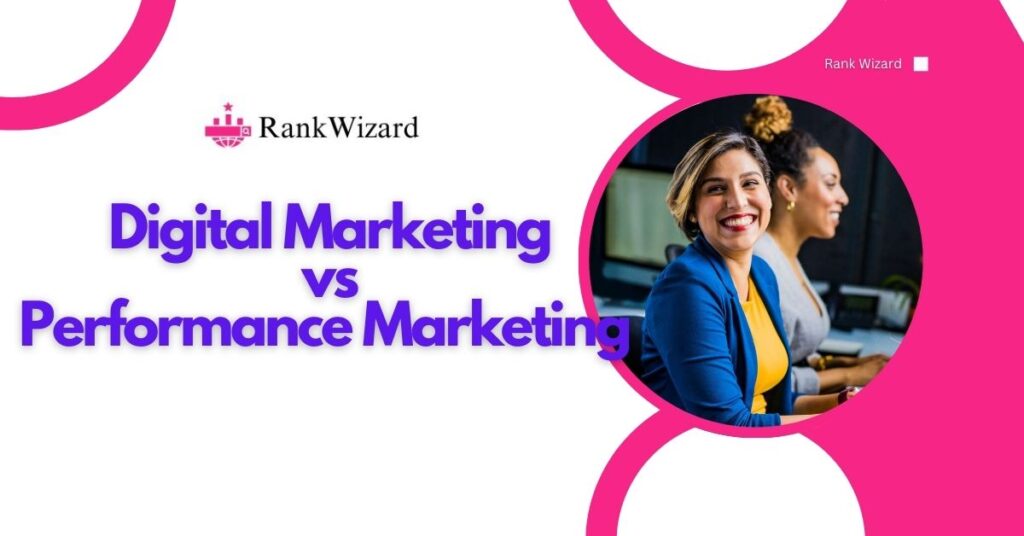
Table of Contents
1. Digital Marketing vs Performance Marketing
When examining Digital Marketing vs Performance Marketing, we’re looking at two fundamental approaches to online promotion. This represents the difference between broad brand-building and targeted, results-driven campaigns. Understanding this Digital Marketing vs Performance Marketing distinction helps businesses:
- Allocate budgets more effectively
- Set appropriate campaign expectations
- Measure success using relevant metrics
- Develop comprehensive marketing strategies
Key Preview:
- Digital Marketing = umbrella term for all online efforts
- Performance Marketing = measurable, ROI-focused subset
- Both can work together for maximum impact
2. What is Digital Marketing?
Digital Marketing forms the foundation of all online promotional activities. When comparing Digital Marketing vs Performance Marketing, digital marketing represents the broader approach:
Definition: The use of digital channels to promote products or services.
Common Channels:
- Social Media Marketing (Facebook, Instagram, LinkedIn)
- Content Marketing (Blogs, Videos, Infographics)
- SEO (Search Engine Optimization)
- Email Marketing
- PPC (Pay-Per-Click) Advertising
Primary Goals:
- Build brand awareness and recognition
- Engage and nurture audiences
- Establish long-term customer relationships
- Drive organic growth over time
3. What is Performance Marketing?
In the discussion, performance marketing represents the more tactical, results-oriented approach:
Definition: A data-driven marketing approach where payment is tied to specific, measurable actions.
Key Characteristics:
- Pay-for-performance model (CPA, CPC, CPL)
- Strict ROI focus and accountability
- Advanced tracking and attribution
- Highly targetable audience segments
Common Channels:
- Affiliate Marketing
- Programmatic Advertising
- Native Advertising
- Retargeting/Remarketing Campaigns
- Performance-based PPC
Primary Goals:
- Generate immediate conversions
- Acquire qualified leads
- Drive direct revenue
- Optimize customer acquisition costs
4. Digital Marketing vs Performance Marketing: Key Differences
The Digital Marketing vs Performance Marketing comparison becomes clearest when examining specific aspects side-by-side:
| Aspect | Digital Marketing | Performance Marketing |
|---|---|---|
| Primary Goal | Brand building & awareness | Direct conversions & sales |
| Key Metrics | Engagement (likes, shares, traffic) | ROI, CPA, ROAS, conversions |
| Pricing Model | CPM, fixed budgets | Pay-per-performance (CPA/CPC) |
| Timeframe | Long-term (months/years) | Short-term (days/weeks) |
| Best For | Establishing brand presence | Immediate revenue generation |
| Flexibility | Less campaign flexibility | Highly adjustable in real-time |
When to Use Each Approach
The choice between Digital Marketing vs Performance Marketing depends on your goals:
- Choose Digital Marketing for brand building
- Opt for Performance Marketing for immediate results
Many successful businesses combine both strategies in their Digital Marketing vs Performance Marketing mix to maximize impact across the customer journey.
Making the Right Choice
Understanding Digital Marketing vs Performance Marketing helps you:
- Allocate budgets effectively
- Set appropriate KPIs
- Develop comprehensive marketing strategies
Remember, the most effective approach often involves elements of both Digital Marketing and Performance Marketing working in harmony.
Need help determining the right balance of Digital Marketing vs Performance Marketing for your business? Contact our experts today for a personalized strategy session!
By strategically implementing both Digital Marketing and Performance Marketing tactics, businesses can achieve both brand growth and measurable conversions. The key is understanding how these approaches differ and complement each other.
